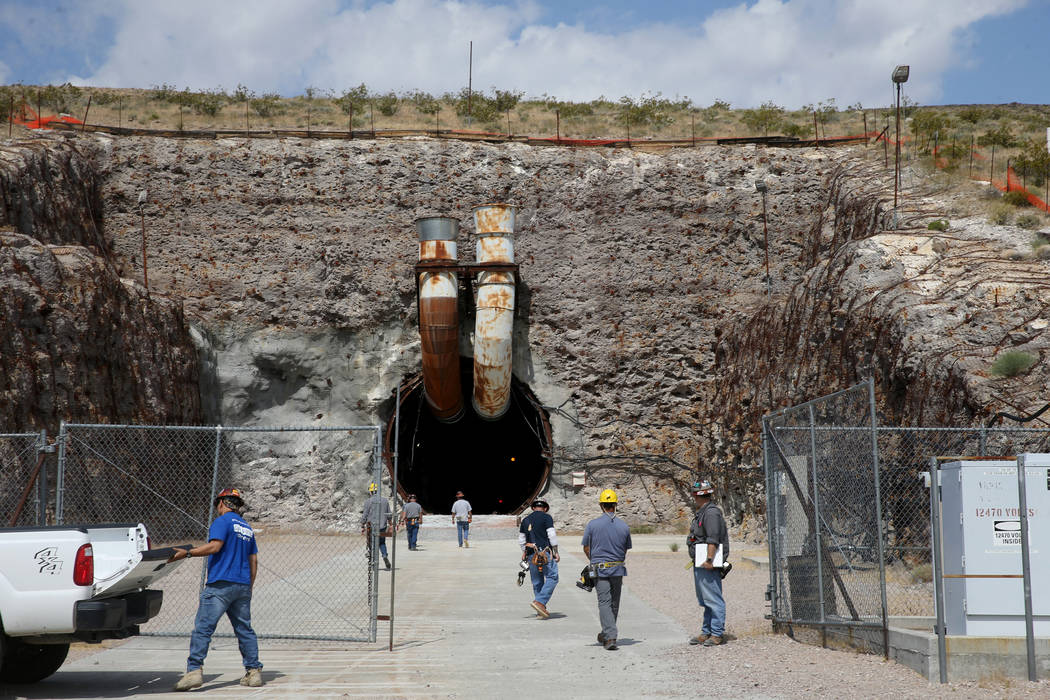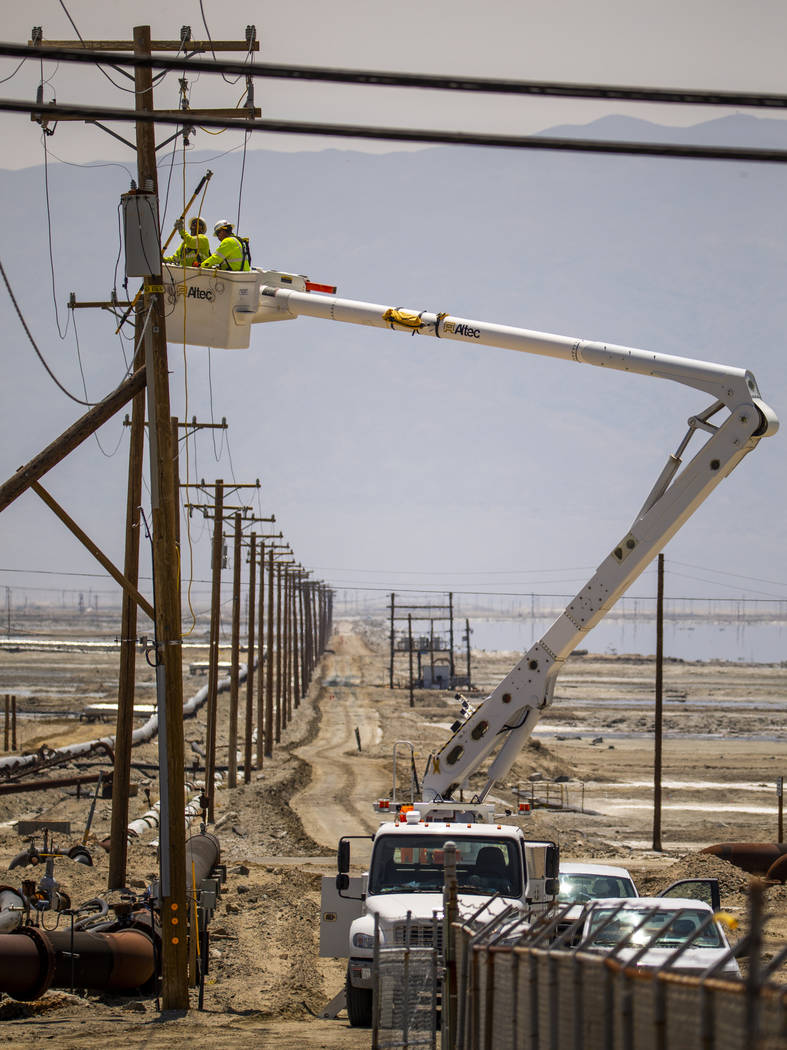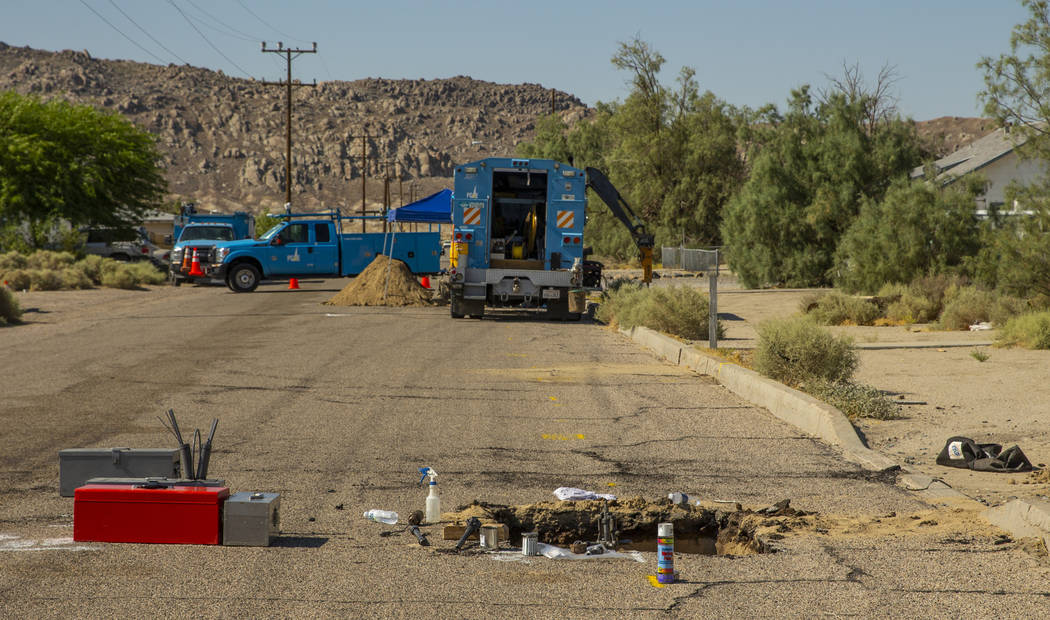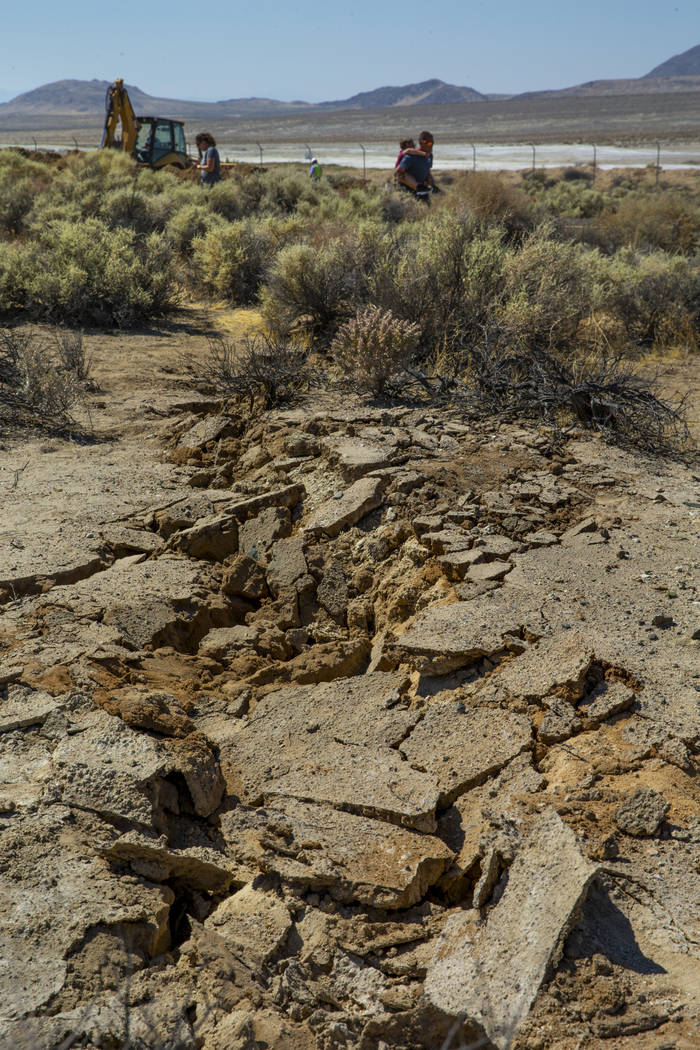Earthquakes rattle Yucca Mountain debate
WASHINGTON — Recent California tremors that rattled Las Vegas were seized upon Tuesday by proponents and opponents of a federal plan to store nuclear waste in a seismic zone in Southern Nevada that includes Yucca Mountain.
Sen. John Barrasso, R-Wyo., said his legislation to jump start the process to open Yucca Mountain is based on studies that take seismic activity into account with storage at the remote Nevada site.
He said the California earthquakes, if anything, showed the need to move spent fuel and radioactive waste from plants where it is currently stored above ground to a more secure repository.
“This doesn’t change my view,” Barrasso, chairman of the Senate Environment and Public Works, told the Review-Journal when asked about the earthquakes.
“We need to find a permanent location for the storage of nuclear waste. I think it’s much safer in Yucca Mountain than in a hundred different locations,” Barrasso said.
But Nevada officials disagree.
Sen. Jacky Rosen, D-Nev., said the “earthquakes Nevadans experienced over the weekend highlight the very real dangers” the state would face with nuclear waste storage.
The temblors in California near Ridgecrest in the Mojave Desert were felt as far away as Los Angeles and Las Vegas. In between lies Yucca Mountain, designated by Congress in 1987 as the site for the nation’s nuclear waste produced by power plants.
Radioactive spent fuel and waste is currently stored at 121 sites in 35 states because the federal government has failed to take possession and store the waste at Yucca Mountain. There’s no waste stored yet at Yucca Mountain, 90 miles northwest of Las Vegas, where an exploratory tunnel was bored into a barren ridge for scientific study.
Political opposition in Nevada to radioactive waste storage has halted development.
Quakes bolster arguments against Yucca
And the 6.4- and 7.1-magnitude tremors over the July Fourth holiday appeared to bolster the arguments by those opposed to the Nevada site.
Rep. Dina Titus, D-Nev., said immediately following the second shake, felt across the state, that it “is yet another reminder of how dangerous it would be to make Nevada the dumping ground for the nation’s nuclear waste.”
The Nevada governor and the state’s congressional delegation have cited seismic activity around Yucca Mountain as a concern for storing nuclear waste above groundwater sources.
Citing state statistics, Rep. Steven Horsford, whose congressional district includes Yucca Mountain and North Las Vegas, said there have been 621 seismic events greater than 2.5 magnitude within a 50-mile radius around the site over the past 43 years.
A recent state-by-state ranking by the U.S. Geological Survey showed Nevada fourth in seismic activity, behind Alaska, Wyoming and Oklahoma. The Silver State was just ahead of California.
“Earthquakes can be dangerous enough in their own right – adding the possibility of a nuclear waste spill in the aftermath is not a risk I am willing to take,” Horsford said.
Horsford, Titus and Rep. Susie Lee, a Democrat, were instrumental in lobbying colleagues to vote against a spending bill to continue the process to build Yucca Mountain.
Rep. Mark Amodei, R-Nev., the only lawmaker from the state on the House Appropriations Committee, voted against that legislation, producing a bipartisan defeat and a large hurdle for the Trump administration and proponents to revive the legal process to develop the Nevada repository next fiscal year.
Earthquakes factored in to Yucca plan
A longtime advocate of building Yucca Mountain, Rep. John Shimkus, R-Ill., a co-sponsor of a House bill to revive licensing hearings on the Department of Energy’s application to build the underground storage facility, said seismic activity is addressed in scientific studies on the Nevada repository.
Shimkus said the Department of Energy’s design for the Yucca Mountain repository accounts for earthquakes large and small over the span of one million years.
Seismologists, geologists, volcanologists and other experts who worked on the Nuclear Regulatory Commission’s Safety Evaluation Report found the design to be acceptable, Shimkus said.
“If anything, the recent California earthquake should accelerate the discussion of Yucca Mountain because earthquakes are felt more on the surface than below ground,” Shimkus said, noting current and decommissioned power plants “within the Ring of Fire along California’s coast.”
Clear earthquake zones first
Another House bill, filed by Rep. Mike Levin, D-Calif., would require the federal government to make a priority of moving first the nuclear waste stored at sites in seismic zones, like the San Onofre nuclear plant in Southern California. The legislation would seek priority removal of radioactive material from seismic areas to Yucca Mountain or authorized interim storage sites.
San Onofre was developed to withstand a magnitude-7 earthquake, and the most recent tremors in Ridgecrest were felt in the communities near the decommissioned power plant, but no damage at that site was reported.
The Department of Energy did not respond to requests for information on earthquake damage at the Yucca Mountain site and tunnels, following the most recent earthquakes.
But the earthquake event in California is another in a string of incidents that have concerned Nevada public officials opposed to the transportation and storage of nuclear waste in a state where no nuclear-generated power is used and no waste is produced.
Last month a train derailed near Elko and 22 cars plunged off the track, raising concerns the Department of Energy’s proposals to ship radioactive waste to Yucca Mountain in plans for the repository.
There were no fatalities or severe injuries as a result of the derailment, although cars that did not leave the track were carrying munitions destined for Hawthorne Army Depot.
A routine federal investigation into the derailment is being conducted to determine the cause.
Contact Gary Martin at gmartin@reviewjournal.com or 202-662-7390. Follow @garymartindc on Twitter.
RELATED
Earthquake warning system could alert Las Vegas of seismic activity
Small California town bands together after major earthquakes
More aftershocks possible, but chances of earthquake in Las Vegas low























